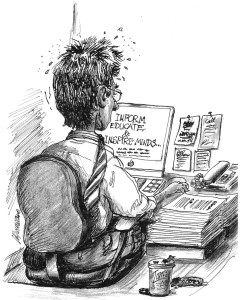|
King Weekly Sentinel https://kingsentinel.com/?p=2920 Export date: Sat Apr 12 18:21:08 2025 / +0000 GMT |
Altering the language confuses and befuddlesMark Pavilons 1  As we continue to evolve as a species on this planet of ours, change should not be detrimental. But in many cases, it seems we've not only forgotten our roots, but have decided to disregard them entirely. Rewriting history – a common practise – is an unwanted pastime, but one has to be ever vigilant in looking for information and uncovering the truth. So, the onus is on us to remain steadfast in our desire for accuracy, truth, and accepting all points of view. That's what journalism is supposed to sort out – taking often complex issues and boiling them down; presenting all viewpoints and leaving it the hands of the public to decide. In this day and age there are more “experts” than ever before, who claim omnipotence in their specific areas. So, the public has a difficult task, not only deciphering fact from fiction, but wading through deficiencies in the English language – rhetoric, jargon, misused cliches and otherwise bending the language so out of shape as to confuse and befuddle. It's working. There's a common practise to alter words, terms and phrases in the name of political correctness. A major holiday greeting card and giftware retailer altered the words of the famous Christmas carol “Deck the Halls” removing the word “gay” (as in “gay apparel”) and replacing it with “fun.” The company relented and pulled the ornament. The Merriam-Webster dictionary defines “gay” as “ bright, lively, brilliant in color.” We are caught up on words, without even considering the message or meaning behind them. Why are we so afraid of offending others that we are willing to compromise our language – our very history – in the name of political correctness? Here are some other ludicrous examples: Schools removing certain books from their shelves because words or messages may be misinterpreted; eliminating the Lord's Prayer and altering national anthems in the classroom; degrading Easter eggs to “spring spheres;” removing the word “God” from everyday speech; a “holiday tree” instead of a Christmas tree. One of the strangest changes I encountered is eliminating the term BC (Before Christ) and AD (Anno Domini), favouring BEC (Before Common Era) and CE (Common Era). I don't know what a “common era” is. Regardless of one's religious beliefs, it's a fact that Jesus lived and walked the earth and so using Him as a point on a calendar is simply that – creating the year 0 as a frame of reference. Merriam-Webster also points out that being “political correct” is “conforming to a belief that language and practices which could offend political sensibilities (as in matters of sex or race) should be eliminated.” It came into vogue in Ontario in the late 1980s and early ‘90s to eliminate gender bias and sexism in the workplace. The Ontario Women's Directorate published a short guide, “Words that Count Women In,” which aimed at curbing stereotyping. While the goal of political correctness is fine, one has to be careful not to lay waste to historical, societal and literary norms and concepts. Reviewing all works of art, literature and film and altering them is not only pointless, but almost blasphemy. Neutering the language is a team effort – you can lay the blame at our school system, teenagers and their use of “text-speak,” the Internet, advertising, music videos, TV, etc. OMG, IDC. Who's sick of hearing “paradigm shift, fiscal sustainability,” and so on? Author George Orwell, in his still studied work “Nineteen Eighty-Four,” took political correctness to the extreme. He created the concept of “Newspeak,” a fictional controlled language implemented by the totalitarian state to limit free thought, and concepts that pose a threat to the regime such as freedom, self-expression, individuality and peace. It constantly shifts vocabulary, eradicating any synonyms or antonyms deemed undesirable. Sound familiar? Orwell first introduced some of these concepts in his essay – “Politics and the English Language,” originally published in Horizon in April of 1946. Modern writing courses often cite this essay for some basic rules – use short words instead of long ones; avoid using scientific or political jargon; avoid metaphors or overused figures of speech. “The great enemy of clear language is insincerity. When there is a gap between one's real and one's declared aims, one turns as it were instinctively to long words and exhausted idioms, like a cuttlefish spurting out ink.” Towards the end of the essay, Orwell writes: “I said earlier that the decadence of our language is probably curable. Those who deny this would argue, if they produced an argument at all, that language merely reflects existing social conditions, and that we cannot influence its development by any direct tinkering with words or constructions.” Orwell's message to us all is to beware of the dangers of monkeying around with the language just to suit an individual purpose. Hence the term “spin doctoring.” This results in political speech and information that contains nothing more than cloudy gobbledygook and insincerity. Human history is fraught with hatred, religious conflict, discrimination, slavery, heinous crimes, genocide, inequality and sexism. Sugar coating them with new and improved catch phrases does nothing to improve humankind. We should be reminded that any meaningful change only occurs when actions and words coincide. Altering the language for the sake of accommodating everyone is useless unless it's taken to heart. |
Links:
|
|
Post date: 2013-11-12 12:09:10 Post date GMT: 2013-11-12 17:09:10 Post modified date: 2013-11-12 12:09:10 Post modified date GMT: 2013-11-12 17:09:10 |
|
Export date: Sat Apr 12 18:21:08 2025 / +0000 GMT This page was exported from King Weekly Sentinel [ https://kingsentinel.com ] Export of Post and Page has been powered by [ Universal Post Manager ] plugin from www.ProfProjects.com |